Graduating Hertz Fellows Poised to Become Science and Technology Leaders
The Fannie and John Hertz Foundation is proud to recognize the most recent graduates of the Hertz Fellowship in applied science, mathematics, and engineering.
This year’s graduating Hertz Fellows have tackled some of the most pressing challenges facing our nation and the world throughout their doctoral studies. Leveraging the flexibility and support offered by the Hertz Fellowship, their research addressed pressing challenges in disease management, improved model predictions for climate change and laid the groundwork for a better understanding of cancers and developmental defects, to name a few.
These fellows are already delivering on their remarkable potential to become leaders in their fields — their work will undoubtedly continue to strengthen our nation in ways that have a meaningful and far-reaching impact, from enhancing national security to improving human health.
We congratulate them and look forward to celebrating the fruits of their careers.
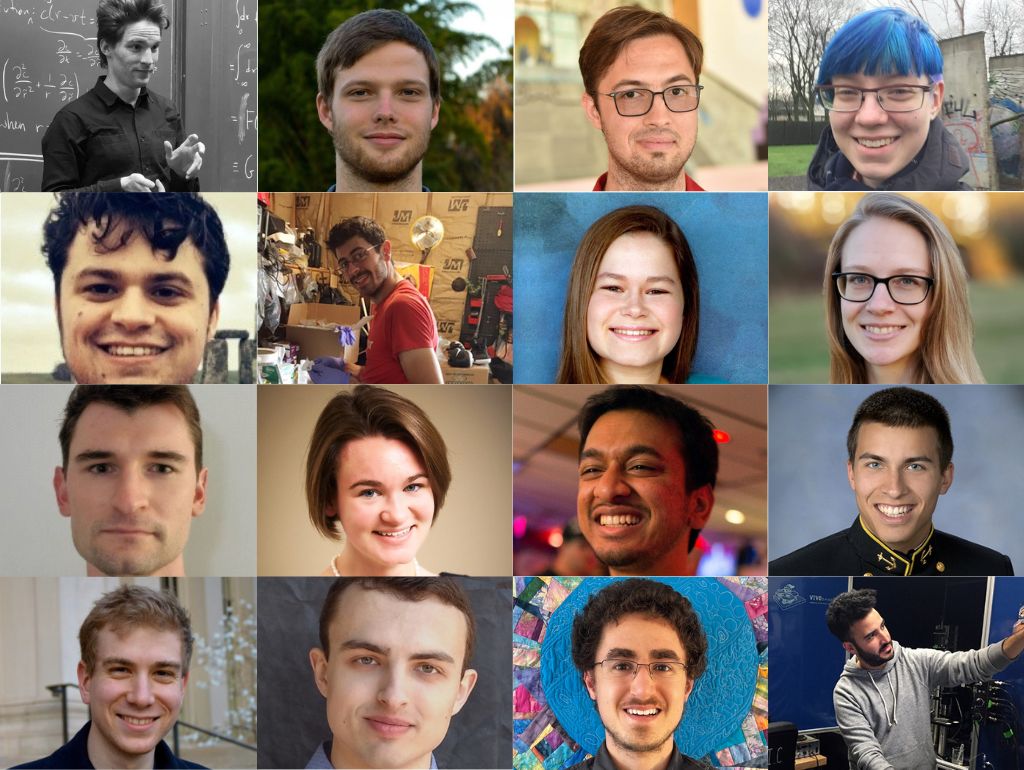
The Hertz Fellowship experience continues beyond the initial award to include permanent membership in a multigenerational, intellectual community of peers that includes some of the nation’s most noted science and technology leaders, offering a unique engine for professional development and collaboration. Hertz Fellows have access to lifelong programming, such as mentoring, events and networking, which has led them to form research collaborations, commercialize technology and create and invest in early-stage companies together, among other opportunities.
Explore the complete directory of Hertz Fellows to learn more about their diverse backgrounds and interests.
Meet the Graduating Hertz Fellows
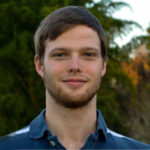
Thesis: Stack-Sorting and Beyond
Colin Defant’s thesis is focused on a certain combinatorial dynamical system called the stack-sorting map. His work shows that there is a powerful and surprising connection between the stack-sorting map and other areas of math such as polyhedral geometry and free probability theory. His thesis work led him to study the relatively unexplored area of noninvertible combinatorial dynamical systems, which he is pioneering.
Colin was the recipient of the Hertz Named Fellowship (anonymous) to support his doctoral work. For the next year, he will be a National Science Foundation (NSF) Postdoctoral Fellow at MIT. He will then move to Harvard University where he will combine the NSF Fellowship with a Benjamin Peirce Fellowship for four years.
“Because of the Hertz Foundation, I was able to spend two semesters visiting MIT and Harvard. These semesters were extremely influential on my development as a mathematician. I learned more about algebraic combinatorics during the first semester when I visited than during any other semester.”
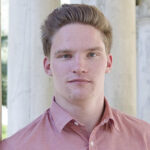
Thesis: Diffusive waves, dynamic instability, chromosome missegregation: dimensionality, discreteness, stochasticity
Paul Dieterle is interested in finding models for biological processes that are insensitive to details. In order to gain knowledge about things such as cell signaling, one must often rely on the coarsest possible description and hope that description is insensitive to details. In Paul’s doctorate work, he constructed broad models for a variety of processes that were unaffected by unknown details. This approach to modeling of complex systems allows one to pin down biological mechanisms even without detailed knowledge of the underlying biochemistry.
Paul was the recipient of the Paul Young Fellowship to support his doctoral work. He is now an associate at McKinsey’s New York office.
“The Hertz Foundation provided stability when I switched fields from atomic physics to biophysics and from experiment to theory. I would have done a different and less satisfying PhD project without this fellowship. I also would not have met many close friends and mentors, several of whom helped me get my job.”
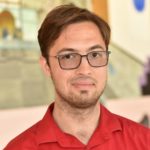
Thesis: Optical Voltage Sensing of Neural Potentials for scalable neural recording
Jordan Edmunds is currently the co-founder and chief technology officer at Axle Mobility, a company working to give the automotive aftermarket the tools and training it needs to fix electric vehicles. He and his co-founder were recently awarded the Harold Newman and David Galas Entrepreneurial Initiative, and are currently in the process of raising a pre-seed round. As a passionate educator, Jordan also shares engaging YouTube videos on topics in the physical sciences and engineering.
Jordan was a recipient of the Lee A. Swanger Engineering and Applied Science Fellowship to support his doctoral work.
“Without the Hertz Fellowship, I would not have been able to do my PhD work, as my advisor of choice didn't have funding to pay my salary. It completely transformed my trajectory from the day I received it and has easily been the single most impactful career event of my life.”
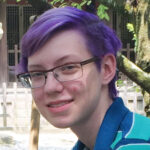
Thesis: Transcriptomic Analysis of Ustilago Maydis Infection and Improving Cassava Brown Streak Disease Surveillance in Sub-Saharan Africa
Looking to improve national survey programs and determine which disease management strategies are most promising, Alex Ferris developed computational models of the spread of cassava brown streak disease in sub-Saharan Africa during their doctoral research. These models demonstrate the potential for clean seed systems to increase cassava yield in infected regions and the impact of focusing surveillance in cassava dense regions.
Alex was a recipient of the Hertz Fellowship in Global Health and Development through a partnership with the Bill & Melinda Gates Foundation. Alex is now working as a research scientist at the Institute for Disease Modeling, part of the Bill & Melinda Gates Foundation’s Global Health Division.
“The Hertz Foundation connected me to an internship at the Bill & Melinda Gates Foundation that introduced me to agriculture research and doing work in low-income countries. The funding enabled me to continue working on that research during the rest of my PhD, in addition to the work I was doing with my official advisor at Stanford University.”
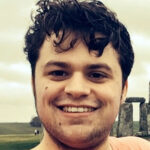
Thesis: Convex programming reformulations and fundamental limits
Linus Hamilton’s work focused on trying to understand what makes neural networks tick. In his doctoral research, he explored convex programming in non-Euclidean space; as a special case, solving the Paulsen problem in operator theory.
Linus was the recipient of the Google Fellowship to support his doctoral work. He is now working at Two Sigma, a financial sciences company, combining rigorous inquiry, data analysis and invention to solve the toughest challenges in investment management, securities, private equity, insurance technology and venture capital.
“The Hertz Fellowship was and is a safety net under my life.”
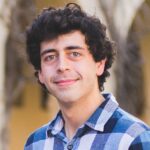
Thesis: A Fluvial Perspective on the Role of Sulfide Oxidation in the Global Carbon Cycle
Preston Kemeny studies the coevolution of life and climate throughout Earth’s history. Preston is interested in the sets of biogeochemical processes that maintain planetary habitability, both today and throughout the geologic past. Preston’s research measuring the isotope ratios preserved in natural archives has the potential to generate novel theories of climate change that will improve model predictions.
Preston was a recipient of both the Cohan-Jacobs & Stein Families Fellowship and Susan & Richard Miles Fellowship to support his doctoral work. He was awarded two postdoctoral fellowships — the Chamberlin Fellowship at the University of Chicago and a fellowship with the National Science Foundation, which will provide a total of four years of postdoctoral research.
“The community of Hertz Fellows is a deep source of inspiration and ideas.”
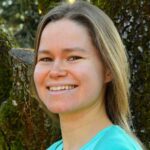
Thesis: Brill--Noether theory over the Hurwitz space
Hannah Larson’s work is in the field of algebraic geometry, particularly algebraic curves. Through her doctoral research, she explained the unexpected behavior of the maps certain special curves admit to projective spaces. Using a new invariant called the splitting type, her results give a new understanding of when curves with certain properties exist.
Hannah was the recipient of the Hertz Named Fellowship (anonymous) to support her doctoral work.
Hannah has been awarded the Clay Research Fellowship, a prestigious position that will fund her research for the next five years. She will be a junior fellow at the Harvard Society of Fellows from 2022 to 2023, and in the fall of 2023, she will begin a new position as an assistant professor at the University of California, Berkeley.
“The Hertz Fellowship is an incredible opportunity to take your research in the directions you want. There is a vibrant community of fellows working in a wide range of areas that is exciting to be part of.”
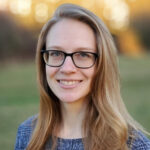
Thesis: Mapping Genotype To Phenotype With High-Throughput Empirical Approaches
During her doctoral research at Massachusetts Institute of Technology, Katherine Lawrence pursued small-scale experiments in atomic, molecular and optical physics for hands-on involvement in probing essential questions of quantum mechanics.
Katherine is currently a machine learning bioinformatician at Oxford Nanopore Technologies.
“I’ve always loved learning about advances and innovations from diverse scientific fields. There’s nothing that sparks creativity like conversations with passionate researchers from different disciplines.”
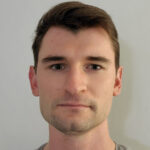
Thesis: Exploring Solvable Chaos In Quantum Mechanics
Yuri Lensky interested in understanding large-and strongly-correlated quantum systems, where many such simple puzzles lead to profound insights and connections. An example from his research, just asking why, when, and how the standard thermal ensemble of quantum mechanics work has led connections to random matrix theory, quantum chaos and even potentially quantum gravity.
Yuri is currently a postdoctoral research fellow at Cornell University.
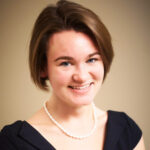
Thesis: ERK signaling dynamics and their role in germ layer patterning
Sarah McFann is interested in how early embryos interpret developmental signals. In her doctoral work, Sarah employed optogenetics, live microscopy and math modeling to better understand which features of the extracellular signal-regulated kinase (ERK) signal are used by the early fruit fly embryo to specify germ layer fates. This research lays the groundwork for a better understanding of how mutations cause errant ERK signaling in humans, leading to cancers and developmental defects.
Sarah was a recipient of both the Hans Mark Fellowship and the Hertz Fellowship in Global Health and Development through a partnership with the Bill & Melinda Gates Foundation. She currently works as a modeling and simulation scientist at the Novartis Institutes for BioMedical Research.
“The Hertz Fellowship allowed me to apply my career interests in writing and math modeling far beyond what my PhD research on its own would have allowed. My Hertz-supported Bill & Melinda Gates Foundation internship was life-changing, in that it opened my eyes to the real-world impact that science communication and math modeling could have.”
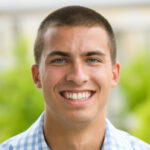
Thesis: Resonant Spatial Light Modulation: Optical Programming and Sensing at the Fundamental Limit
Christopher Panuski’s work aims to push optical technologies towards their fundamental limits. His thesis work sought to develop a solution to high-speed optical "programming" at the wavelength (i.e. micron) scale. His thesis project assembled an international collaboration to solve this problem. It ultimately developed a new class of optical displays and sensors operating near their fundamental limits, thereby enabling new directions in photonics.
Christopher was a recipient of the Elizabeth and Stephen Fantone Fellowship to support his doctoral work. He has now returned to the United States Navy where he hopes to combine the technical expertise developed during his doctoral studies with operational experience to lead teams solving complex national security issues.
“Without the gracious support of the Hertz Foundation, I wouldn't have been able to pursue a PhD while continuing my naval career. The fellowship's freedom also empowered me to pursue an entirely new direction of study in my research group.”
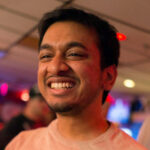
Thesis: Building a wiring diagram of the human genome
Suhas Rao’s thesis work sought to understand distal regulation of transcription by mapping the 3D structure of the genome and the connections between distal enhancer elements and the genes they control.
Suhas was the recipient of the Harold and Ruth Newman Family Fellowship to support his doctoral work. He is currently pursuing his MD at Stanford University.
“The Hertz Fellowship has enabled me to take tremendous risks and take my time to see my project through to fruition, for which I am very grateful.”
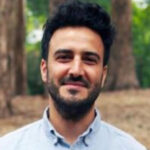
Thesis: Methods for High-throughput, Cellular-Resolution Estimation of Synaptic Properties
Ben Shababo is fascinated by how the world we perceive around us is constructed inside each of our heads.
His doctoral work involved developing a high-throughput method which combines two-photon holographic optogenetics, electrophysiology and machine learning to uncover the fine-scale physiological structure of neural circuits. The data produced by this method will enable neuroscientists to better understand the connection between neural coding and the underlying neural circuits that support such coding.
Ben is currently working as a data scientist at Cellular Longevity.
“The Hertz Fellowship provided me with the freedom to develop an interdisciplinary thesis project and establish an inter-university collaboration that continues today.”
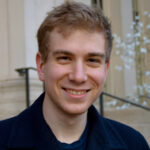
Thesis: Developments in Complex Systems Science with Applications to Political Systems and Pandemic Response
Alexander Siegenfeld’s research leveraged the application of concepts from physics to understand both the general properties of complex systems, as well as those of specific systems such as democratic elections. In his work, he used a multi-scale framework to identify a system’s largest-scale behavior, which allowed him to identify relevant leverage points for intervention in situations such as fighting pandemics, reducing democratic instability, and creating more robust economies.
Alexander was a recipient of the Hertz Fellowship in Global Health and Development through a partnership with the Bill & Melinda Gates Foundation. Alexandar is now in a postdoctoral research position at the New England Complex Systems Institute where he will apply the research developed throughout his doctoral work to economic systems.
“The financial and community support of the Hertz Foundation were instrumental in allowing me to pursue an unorthodox research program focused on addressing what I feel to be some of the most important societal questions concerning governance, economics, and pandemic response.”
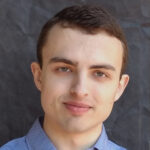
Thesis: Structural imaging and electro-optical control of two-dimensional semiconductors
Andrey Sushko’s doctoral work focused on controllable, engineered quantum systems at the interface between condensed matter and AMO physics. Throughout his doctoral program, Andrey remained involved in a student-led engineering project he started during his undergrad at Stanford University, which focused on developing long-endurance altitude-controlled balloons.
Andrey was the recipient of the Professor Mauro Ferrari Fellowship to support his doctoral work. In 2019, he co-founded WindBorne Systems to leverage his balloon technology for improving weather forecasts, and he is now the company’s chief technology officer.
“The commitment of the Hertz Foundation to support their fellows no matter where their research or career trajectory heads gave me the freedom to develop a passion-project into a startup as soon as the opportunity to do so arose.”
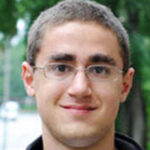
Thesis: Generative Statistical Methods for Biological Sequences
Eli Weinstein is interested in generative statistical methods for biological sequences. In his work, Eli develops techniques to learn from complex observational sequence data and predict novel sequences that can be synthesized in the laboratory. These methods have application in evolutionary biology, immunology, microbiology, virology, clinical genetics and many other areas of biology, biomedicine and biotechnology.
Eli was the recipient of the Hertz Named Fellowship (anonymous) to support his doctoral work. He is now a postdoctoral research scientist at Columbia University.
“The Hertz Fellowship provides extraordinary resources, an extraordinary community and extraordinary encouragement. I'm very grateful for the impact it had on my graduate school research.”